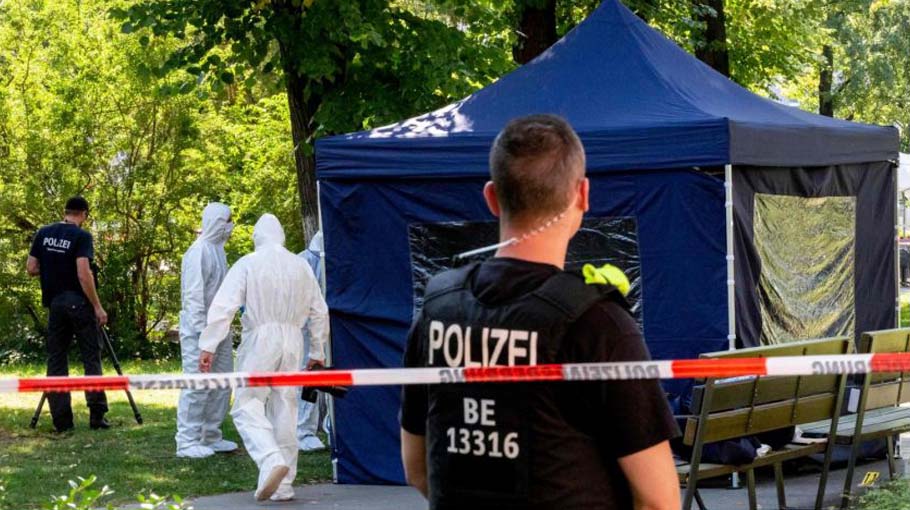German court convicts man in Russia-linked murder in Berlin

A German court convicted a 56-year-old man of an execution-style murder in Berlin, reviving a dark episode in recent relations with Russia and risking further diplomatic friction.
The Berlin Regional Court on Wednesday ruled a man with links to Russia's FSB intelligence service was guilty of the killing and sentenced him to life in prison, news agency DPA reported. The court couldn't be immediately reached for comment. Robert Unger, the accused's defense lawyer, didn't immediately reply to an e-mail seeking comment.
The verdict could put pressure on new Chancellor Olaf Scholz to take a harder line on the Kremlin as he seeks to ease tensions. Prosecutors had said the killing, which occurred in broad daylight in a popular city park in 2019, was an assassination ordered by Russian government officials.
In his first address to parliament after being sworn in a week ago, Scholz said on Wednesday that Europe must be united in seeking dialogue with Russia as part of a new "Ostpolitik" - evoking the Cold War-era foreign policy of his predecessor Willy Brandt, who in the 1970s sought to engage with the Soviet bloc.
The timing of the court ruling is delicate. The US and Europe are weighing a response to aggressive action against Ukraine as Russia amasses over 100,000 troops on the border.
Scholz reiterated in the Bundestag - about 1.5 miles from the site of the murder - that any violation of Ukraine's borders will carry a heavy price for the Kremlin. Steffen Hebestreit, Scholz's spokesman, said it was too early to comment on the court's decision.
The judges identified the man as Vadim Krasikov. He was charged in 2020 with gunning down a former militia leader in the second Chechen war against Russia at the behest of Russian intelligence. The victim, Zelimkhan Khangoshvili, participated in hostilities from 2000 to 2004 and had sought refuge in Germany.
The killing on was an act of revenge against a man deemed a terrorist by the Russian state, prosecutors had told the court. They said Krasikov carried a Russian passport with a fake identity.
The defendant in court had insisted he was Vadim Sokolov, as shown by the passport he carried, and denied being Krasikov. His lawyer told the court that there isn't enough evidence to convict his client.
The brazen circumstances of the August 2019 killing featured tactics reminiscent of the Cold War and raised the specter of Russian involvement, prompting calls for a German reaction.
Read more: Germany committed to Ukraine's gas transit role: Chancellor Scholz
Krasikov shot Khangoshvili at close range in Berlin's Kleiner Tiergarten with a Glock 26 pistol that was equipped with a silencer. He dispensed with the weapon, along with the e-bike he fled on, in the nearby Spree River, according to the indictment.
He was arrested later the same day and has been in custody ever since. Federal prosecutors charged him in June 2020. The park, a seven-minute drive from the Chancellery, is located directly next to the central Berlin criminal court where the trial is taking place.
Russia has consistently denied involvement. President Vladimir Putin in December 2019 pledged to cooperate with the German probe, although he referred to the victim as a "very tough and bloody man" who was wanted in Russia.
Germany expelled two Russian diplomats in December 2019 after the prosecutor's initial findings in the case, citing a lack of legal assistance from Moscow. When charges were brought, the Foreign Ministry signalled it would hold off on further action until a verdict is reached.
The case echoes the 1997 "Mykonos" trial, when a Berlin court found that the Iranian government ordered the killing of four Kurds in a Greek restaurant in the German capital. It caused a diplomatic crisis between Germany and Iran as the judges made reference to "terrorist attacks" by the Iranian government.





